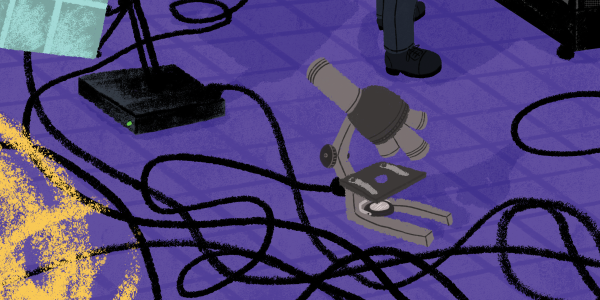Lucas, an associate professor of political science, takes a data-driven approach to investigating our most pressing political questions.
Christopher Lucas spends a lot of his time researching how digital technology affects American political attitudes — a topic that, for many, triggers a sense of existential dread. But Lucas’s innovative research has found there might be less to worry about than previously feared.

In 2020, the associate professor of political science set out to study the impact of political deepfakes, synthesized video and audio clips in which a person’s face, body, or voice has been digitally altered. “There’s a popular perception that this type of media will undermine our ability to learn accurate information about politics,” he said. But after surveying more than 5,700 people nationwide, he found that deepfake videos had no greater influence on the American public than any other type of disinformation campaign.
For another study, Lucas and colleagues turned their focus to YouTube’s recommendation algorithms. They wanted to know if the algorithms sent people down online rabbit holes that led to politically extreme content, or if people who ended up viewing extremist videos had a preexisting appetite for them. Once again, they found no evidence that the algorithms fueled political extremism.
While there’s no guarantee that emerging technologies won’t pose threats in the future, Lucas said the results should offer some sense of relief: “We haven’t found evidence for the potentially hyperbolic concerns that these technologies pose a threat to democracy.”
Lucas, who joined WashU’s top-ranked Department of Political Science in 2018, is helping further grow the department’s national reputation for data-driven social science. A faculty affiliate with WashU’s Division of Computational & Data Sciences, his research has leveraged emerging technologies to investigate a range of topics. For his research on political communication, he developed a data analysis tool that examines minute vocal variations to explore not just what politicians say, but how they say it. Another project, supported by Arts & Sciences’ Incubator for Transdisciplinary Futures, involves analyzing police body camera footage to determine what causes police-civilian encounters to escalate or deescalate. That project brings together multiple data-minded researchers including Andrew Jordan, assistant professor of economics, and Soumendra Lahiri, the Stanley A. Sawyer Professor in Mathematics and Statistics.
“All of these technologies are transforming research and, similarly, transforming politics,” he said. “It’s an ever-changing landscape, and it will be for a while.”
This story is a part of a larger feature about WashU’s digital transformation initiative, which appeared in the Spring 2025 issue of Ampersand magazine. See more stories from the magazine and browse our archives.





